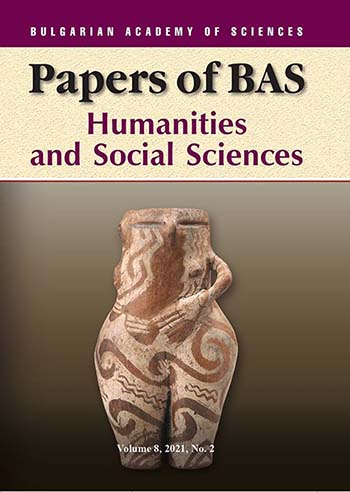Non-verbal theatre on the stage of international theatre festivals Sofia Puppet Fair and World Theatre in Sofia
Non-verbal theatre on the stage of international theatre festivals Sofia Puppet Fair and World Theatre in Sofia
Author(s): Yanita KirovaSubject(s): Theatre, Dance, Performing Arts, Fine Arts / Performing Arts
Published by: Издателство на БАН „Проф. Марин Дринов“
Keywords: theatrical festivals; non-verbal theatrical forms; non-verbal communication; Sofia Puppet Fair; World Theatre in Sofia
Summary/Abstract: Non-verbal theatrical forms and non-verbal communication in theatre largely refer to those “miracles” that theatre has strived for during the years of its metamorphosis in order to reach universal conditions of understanding and communication without the need for knowledge of foreign languages or customs and providing similar historical attitudes and life views, regardless of cultural and social differences in spaces. The article focuses on the issues concerning precisely the place and role of non-verbal theatrical forms on the stage of two theatrical international festivals, which take place in Southeast Europe (since the beginning of the 21st c.): Sofia Puppet Fair (since 2002) and World Theatre in Sofia (since 2007). The issues have been addressed in terms of the sphere of non-verbal theatre and how non-verbal forms are part of contemporary theatrical trends and the aesthetic profile of the global theatre scene over the past two decades, reflected in the programme selections of festival editions over the years. Despite some differences in the profiles of the two festivals studied, the results of the analysis of the festival repertoires clearly show that non-verbal theatrical forms occupy an essential part of the festival programmes of two of the largest and most established international festivals on the territory of Southeast Europe. Non-verbal theatre is part of the world’s tendencies to search for new expressive means and non-standard forms for reading classical texts as well as for creating contemporary author’s works. The universal form of non-verbal communication is also at the heart of the theatre’s attempts to reach a wider audience.
Journal: Papers of BAS. Humanities and Social Sciences
- Issue Year: 8/2021
- Issue No: 2
- Page Range: 146-159
- Page Count: 14
- Language: English

